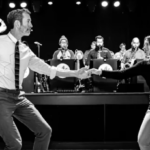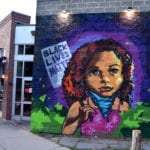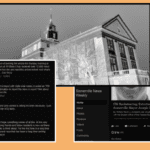
“The Sligos of the world might become history a lot quicker than people might think”
The Dig - Greater Boston's Alternative News Source
Written by RÓNÁN FITZGERALD Filed Under: News, News to Us, NEWS+OPINIONS

“The Sligos of the world might become history a lot quicker than people might think”
Written by JULIET NORMAN AND ALEXIS CRANDALL Filed Under: MUSIC

Catching up with Somerville's new, much-needed live performance venue and function space
Written by GREG COOK Filed Under: A+E, Visual Arts

In June, Jason “Swat” Talbot was invited to paint a mural on Posto, the pizza place outside Somerville’s Davis Square. Amidst the Black Lives Matter protests, someone had tagged “BLM” on the wall, Talbot says, “really sloppily.”
Written by MARC HURWITZ Filed Under: Better Boston Beer Bureau, Drinks, Eats, LIFESTYLE

Elm Street Taproom—which is not a brewery, by the way—is so scarily like Democracy Brewing in look and feel that the two appear to be like doppelgangers, almost like beer-based versions of, say, Larry David and Bernie Sanders.
Written by LYNNE DONCASTER Filed Under: News, NEWS+OPINIONS
Somerville residents squawk about the state of infrastructure, deteriorating public art
Written by JASON PRAMAS Filed Under: Eats, LIFESTYLE
The Boston area has been in the midst of a bit of a bakery renaissance in recent years. The growth of small upscale cafe chains like Flour and Tatte is testament to Hub dwellers’ love of sweets, and we don’t
... read more
Written by CAROLYN BICK Filed Under: News, NEWS+OPINIONS

The oil spill is just one of the many issues Iappini and others have endured, and which have been a common topic of neighborhood gossip for years around Davis Square.
Written by CAROLYN BICK Filed Under: News, NEWS+OPINIONS

Why would Somerville Mayor Curtatone be seen with this guy?
Written by DIG STAFF Filed Under: COLUMNS, Media Farm

All this says is that Tauro contacted and complained to the FBI. Which is different than an FBI investigation, or so we thought.
Written by JAKE MULLIGAN Filed Under: A+E, Film
It’s no leap to say that the conversations we’re having now about sexism and gender representation—in art and in life—are growing perpetually louder. So when we look back at Sam Peckinpah, who directed masculine-minded genre pictures defined by their resolutely cruel tone, we look with a microscope: Was he getting off on the explicit violence? Was he as spiteful of women as he was of the men in his movies? Was he a caricature of John Wayne-era machismo—has his time passed? Many of his films are playing the Somerville Theatre this summer. So while we can’t speak to his character, we can speak to his work. And there’s artistry in his cruelty.
When we talk about that artistry, we often do so by talking about aesthetics: The discontinuous, shell-shocked editing of the gunfights in The Wild Bunch (July 15), or the blood-streaked textures of the cinematography in Bring Me the Head of Alfredo Garcia (August 5). But Peckinpah’s voice is also defined by an abiding interest in the darkest pockets of male existence—in the intricacies of codes of honor among thieves, in the effects of combat on body and mind, and in the psychological causes of sexualized violence. And those interests were clear even back when his movies were filmed with a more functional eye.
Take 1962’s Ride the High Country, which—save for some stunning moments set in a preacher’s shack, where Peckinpah shades everyone as though they were under candlelight—visually resembles many other Westerns of its era. The narrative also seems typical: Joel McCrea plays an aging gunman hired to transport gold from a mining colony, and he brings an old outlaw friend (Randolph Scott) and a young buck (Ron Starr) along with him. The latter pair plan to double-cross him for the loot, but then the young one falls for the aforementioned preacher’s daughter (Mariette Hartley), awakening all his moral impulses in the process.
We’ve heard this one before. But then the rhythm drops out from under us. Hartley’s character is engaged to one of the miners, and she marries him. It’s only after “I do” that she realizes her beau intends to share her with his snaggletoothed cousins. Peckinpah shoots the whole ordeal from her perspective, lingering on the details as she’d notice them: The tackiness of the local madam, then the shabbiness of the bar they’re in, and then—as the camera shakes with a wildness it never possessed before—the brazen passes of her new relatives. We stay with her point-of-view the whole way through.
It’s a sequence that recontextualizes similar incidents in other Peckinpah films, like the traumatic assaults that send Straw Dogs (July 22) into its own fits of furious violence. Beyond the blood, the gore, and the brutal displays of misogyny, there’s a melancholy and a terror, embodied by sequences like this wedding—there’s a lament that a man’s world is the one we’re stuck with.
=&0=& SOMERVILLE THEATRE. 55 DAVIS SQ., SOMERVILLE. JULY 1. 8PM/NR/$10. SOMERVILLETHEATREONLINE.COM
